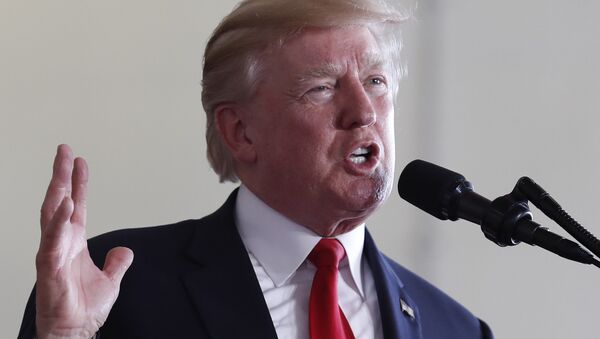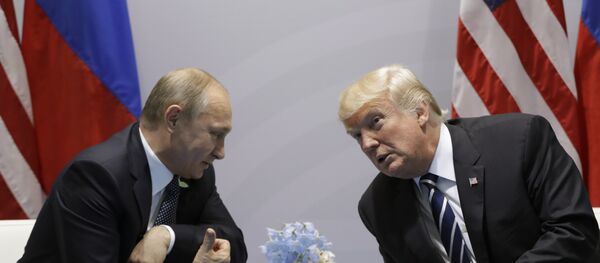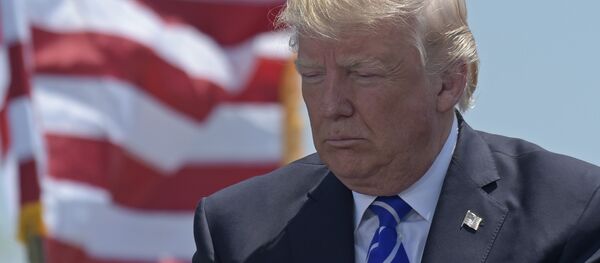The legislation punishes Russia for its alleged interference in the 2016 election as well as military activities in Ukraine, Crimea and Syria. The sanctions target Russia's defense, intelligence, mining, shipping and railway industries and restrict dealings with Russian banks and energy companies.
Trump in a statement said he hoped US-Russian cooperation on major global issues would make the sanctions no longer necessary. He also warned that the measures could actually unite the countries targeted.
Russian Prime Minister Dmitry Medvedev said Wednesday that with the adoption of the law on new anti-Russian sanctions, the United States had declared a fully-fledged trade war on Russia, and now there is no hope for an improvement in relations with the new administration.
BIPARTISAN HOSTILITY
The bill had overwhelmingly passed both houses of Congress by "veto proof" type margins before landing on Trump’s desk to sign into law.
George Mason University School of Law Professor Francis Buckley told Sputnik on Wednesday that Trump had to yield to overwhelming political pressure in signing the bill which was strongly supported by both Republicans and Democrats.
"The administration is conducting a strategic retreat on the issue, bending to Congress," Buckley admitted.
After the president signed the bill on Wednesday, US lawmakers on both sides of the aisle expressed concerns over Trump’s reservations and alleged that the White House might not follow the stipulations related to Russia.
Buckley argued that Trump would likely not heed these calls, noting how he has already shown he is capable of taking decisive and unexpected actions very fast on key issues, and will likely seek opportunities to improve relations with Moscow.
The Trump administration "is capable of a swift pivot, as we have seen," Buckley added.
However, while Trump still wanted to improve relations with Russia, he did not appear at the moment to have the opportunity to do so, Buckley observed.
"Right now we are in stasis," he concluded.
DETENTE DESTORYED
University of Pittsburgh Professor of International Affairs Michael Brenner told Sputnik that even though Trump had criticized the new sanctions bill, by signing it into law he had effectively acknowledged that he was not free to improve foreign relations with Russia.
Trump had always been an isolated figure in Washington political circles and in the US foreign policy establishment in his desire for good relations with Russia, Brenner explained.
"Trump's instinctive feeling that it would be a good thing to make deals with Putin never had any support in either Congress or the foreign policy community. Only [Secretary of State Rex] Tillerson inside the administration agreed with it," he said.
However, Brenner also agreed that Trump genuinely wanted to avoid setting off new clashes with Moscow or risk bilateral relations deteriorating further.
"That said, it is reasonable to expect that Trump will steer clear of seriously provocative actions, especially of a military character," he said.
Trump was unique among leading US politicians and policymakers in that he had come to the issue of US-Russia relations fresh and had tried to avoid being conditioned by so-called experts to accept the prevailing orthodox wisdom of hostility towards Moscow on the issue, Brenner explained.
"The thing to keep in mind about Trump's deviation from the pervasive American line toward Russia and Syria is that it was not based on critical analysis or a considered view of US foreign policy," he said.
Before winning the presidency, Trump had never paid much attention to theoretical models of US foreign policy applied to Russia or Syria, Brenner noted.
"He never paid either much attention — so he just came at them with no preconceptions formed by socialization into the standard [rhetoric] stream. To his fresh eyes, what we were doing simply made no logical sense," he said.
However, while this approach had given Trump a fresh perspective to approach such issues, it had also left him politically isolated when he tried to address them, Brenner cautioned.
Russia has denied all allegations of interfering in the US election, as well as claims it meddled in Ukraine’s internal affairs. Conversely, Moscow has noted that its actions in Syria are at the invitation of President Bashar Assad’s government, while US operations are not approved by the Syrian government or UN Security Council.



